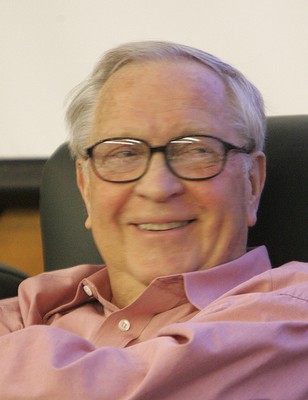Chancellor Rogers makes plea for funding of higher education
Chancellor Jim Rogers pleaded with Gov. Jim Gibbons not to reduce new funding for the Nevada System of Higher Education, saying the action would force the system's two universities to eliminate faculty and class sections.
In a three-page letter sent Wednesday, Rogers said Gibbons' proposal would "threaten the very fabric of higher education in this state."
"The impact on our economy and literally our future is predictable, obvious and dire," Rogers wrote. "For my part, I will not be the Chancellor who offers up this destruction."
Faced with a predicted shortfall in revenue, Gibbons asked all but three state agencies last week to reduce their requests for new funding by a collective total of $111.18 million.
The governor's request also drew criticism from another state office, the Nevada Supreme Court.
In a letter obtained Wednesday, Chief Justice Bill Maupin said the high court already has trimmed its spending request, and questioned the governor's power to control the court's spending.
The university system is requesting about $52 million in new funding, but Gibbons asked the system to cut more than 60 percent of that, Rogers said in the memo.
If it does submit to budget changes, Rogers said the University of Nevada, Las Vegas and the University of Nevada, Reno would have to forgo adding up to 225 faculty and administrative positions and 700 class sections.
At Truckee Meadows Community College in Reno, plans to offer remedial education courses in the high schools would be canceled and a freeze on new hiring would cut student support services, he said.
Also, the Community College of Southern Nevada would face reductions in services for ethnic and cultural diversity programs and workforce training, he said.
The higher education system is facing funding shortfalls because of declining enrollment at all but a few of its institutions.
The Legislature funded the state's colleges and universities at 84.5 percent of the national average. Because of the enrollment shortfalls, Gibbons said he would raise the percentage to 85.5 percent.
Rogers attributed the declining enrollment to the creation of Nevada State College at Henderson, higher admissions standards at UNLV and UNR and tighter restrictions on the Millennium Scholarship.
"It does not seem ... reasonable to have made these decisions and then ask the affected institutions to absorb the financial cost," Rogers wrote.
Much of the $52 million is also made up of "hold harmless funding," which funds the schools in the event their enrollment drops.
Gibbons' budget orders will not affect transportation construction, child welfare or public education.
Gibbons spokeswoman Melissa Subbotin said Thursday that the governor chose to reduce funding for higher education because the system, unlike K-12 education, can seek private funding.
"It's important to note that it's not just higher education," she said. "We're asking everybody to participate (in reducing their budget requests)."
"This isn't a decrease in funding," Subbotin said. "It's a decrease in the increase."
Rogers said it wasn't his concern whether some programs are more deserving than others.
"Do you think the prison system should suffer at the hands of higher education? I'd say absolutely," Rogers said. "I'm not for funding prisons over higher education. As for us and some other social program, I don't know enough about the other social programs to say we're superior."
He said he simply had to make a strong case to legislators for funding higher education and expects to hear a response to his memo from the governor's office next week.
Maupin wrote to the governor that part of the court system improvements -- pay for judges and funding for specialty courts -- are off limits to any reduction.
Maupin said that when the money for pay and for specialty courts are excluded, the state's judicial system "has exceeded its participation in the effort to reduce the general fund appropriations."
The justice said the court's request for $4.3 million in operating cost increases fall outside the purview of the governor and Legislature.
"The Supreme Court has control over its operating budget," Maupin said.
Subbotin said that Gibbons has met with Maupin and "is considering his concerns."
Because the courts are a separate branch of government, the governor can only request reductions by the court system.
Review-Journal Capital Bureau Chief Ed Vogel and Associated Press writer Brendan Riley contributed to this report.

















